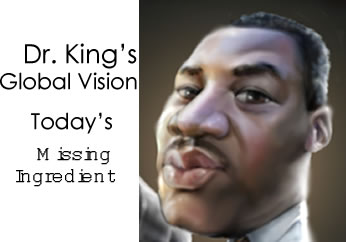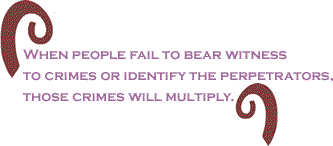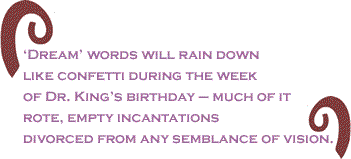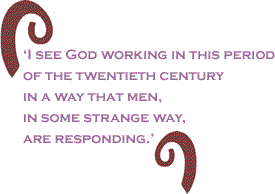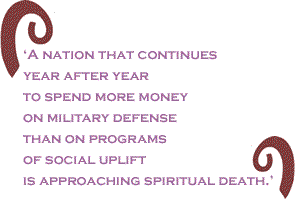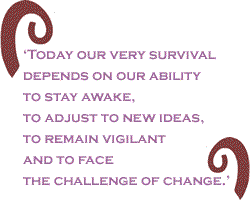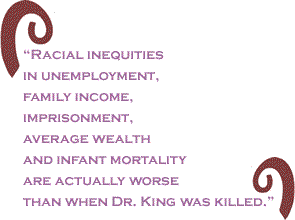
|
|||||||||||||||||||||
Dr. Martin Luther King Jr. was the star among many heroes in the demise of Jim Crow, the century-long twilight between slavery and the achievement of full Black U.S. citizenship rights. This leap out of purgatory – an incredible, decade and a half rush of political adrenaline – began with the 1954 Supreme Court decision outlawing segregated schools. It promised to usher in the New Black Man and Woman: confident, self-aware, ready to take their places among the proud peoples of the world. Ready, like Dr. King, to use their newly equal legal status to change history. Every January 15 we should be humbled to confront the reality that we, African Americans, have not fulfilled the promise. “Dream” words will rain down like confetti during the week of Dr. King’s birthday – much of it rote, empty incantations divorced from any semblance of vision or even the most tentative intentions towards action. A minority of celebrants will realize, with a sudden shudder, that it is not Dr. King who is stuck in time by death, but African Americans of the present, through their own inaction. Dr. King saw the power of people in motion, and assumed the awesome responsibility and risk of attempting to guide the flow to its ultimate destination: universal human freedom. His vision was the product of the collective Black experience, and his own – starting with the 1955 Montgomery bus boycott, when Blacks through their own efforts cracked the White Wall. King’s disciplined intellect allowed him to assess these experiences, and measure them against the backdrop of the larger, human mural.
“Dreams” were things that were actually possible, based on the particulars of one’s circumstances, conditions in the larger environment, and the exertion of human will. King thanked his God for these personal insights, and allowed the rest of us into his musings with the Deity – a way of sharing the vision, so as to strengthen our will. The man who led the “movement” was able to do so because he saw clearly his – and our – place in human history. In Memphis on the night before his death, during the same sermon in which he so famously told of having “looked over” the mountain to see the “promised land,” Dr. King let the congregation know why he set out on his journey in the first place.
Dr. King lifted his audiences out of Jim Crow’s sunken domain, set them in the company of struggling humankind the world over, and called upon African Americans to respond as global citizens to the way that “God” was “working in this period….” By 1968 the legal barriers that had confined Blacks for 100 years were reduced to rubble. Now was the time for African Americans to assume the responsibilities of full-grown men and women, to definitively throw off the mental shackles of Jim Crow by confronting the larger forces that had created it. “When I say questioning the whole society,” King said in his speech, “Where Do We Go from Here,” August 16, 1967, “it means ultimately coming to see that the problem of racism, the problem of economic exploitation, and the problem of war are all tied together. These are the triple evils that are interrelated.”
The “promised land” was not a green pasture just over the hill, but a new field of struggle in which African Americans would add their voices and unique experiences to the arsenals of human resistance to evil. This was the prize and the path. Not only was it morally right to oppose the “triple evils,” it was also the intelligent, civilized course for all of humanity. “The Western arrogance of feeling that it has everything to teach others and nothing to learn from them is not just,” said King in his historic anti-Vietnam War speech at New York’s Riverside Church, exactly one year before his assassination. “A true revolution of values will lay hands on the world order and say of war: ‘This way of settling differences is not just.’ This business of burning human beings with napalm, of filling our nation's homes with orphans and widows, of injecting poisonous drugs of hate into veins of people normally humane, of sending men home from dark and bloody battlefields physically handicapped and psychologically deranged, cannot be reconciled with wisdom, justice and love. A nation that continues year after year to spend more money on military defense than on programs of social uplift is approaching spiritual death.” King’s April 4, 1967 Riverside Church speech is widely considered to mark his definitive break with President Lyndon Johnson’s war in Vietnam. The above passage also appears, word-for-word, in “The World House” chapter of King’s 1967 book, Where Do We Go From Here: Chaos or Community?
Like Rip Van Winkle, large segments of Black America fell asleep almost as soon as Dr. King’s voiced was silenced. Others saw the “revolution” only in terms of expanded opportunities for personal upward mobility. Unfortunately for Black America, many of these same people became Black “leaders.” They cannot find themselves or their fellow African Americans on the sweeping map of history, and so have no idea what direction to take. They are only vaguely aware that the “triple evils” King spoke of 37 years ago – racism, economic exploitation, and war – are now infinitely more dangerous to world survival than while King lived. Consequently, these “leaders” possess only the narrowest understanding of the threat that the Bush Pirates' global offensive poses to African Americans, specifically.
Erroneously assuming that personal wealth equals group leadership, too many beneficiaries of the great leap out of Jim Crow use their influence to lull the rest of the Race to sleep. Like an adolescent class, they believe they have achieved their present status in life independent of historical Black struggle – or worse, that Dr. King, Malcolm and countless others were sacrificed for the purpose of their own eventual affluence. On King’s birthday, they celebrate themselves, oblivious to the blasphemy they are committing. These “distracting classes” – in that they purposely present distracting stories of anomalous Black successes to counter the facts of massive social disintegration – have always been with us. However, with each ratcheting up of the global and domestic crisis, we can afford them less. Nevertheless, it is largely the distracters who will be on ostentatious display during MLK week. Totally lacking in leadership qualities, they refuse even to bear witness to the realities of African American life. According to a new report by United for a Fair Economy, “racial inequities in unemployment, family income, imprisonment, average wealth and infant mortality are actually worse than when Dr. King was killed.” Titled “State of the Dream 2004: Enduring Disparities in Black and White,” the report concedes that “progress has been made in narrowing the divide in per capita income, poverty, homeownership, education, life expectancy and median wealth, but so slowly that the gaps would take decades or even centuries to close at the current rate.” Some stark statistics:
Statistics are important elements in assessing the progress, or backsliding, of a people. But the mere recitation of numbers absent an understanding of that people’s connectedness to the larger world, leads nowhere. One must locate the nexuses and vectors of affliction, the causes of human misery. Leadership means, first, bearing witness to the Truth – as indispensable an act in the secular world as it was to King’s liberation theology. It does not take a theologian to understand that when people fail to bear witness to crimes or identify the perpetrators, those crimes will multiply. The “triple evils” of racism, economic exploitation and militarism are threatening to burn down Dr. King’s “World House.” The chief perpetrator plans to lay a wreath on the martyr’s grave in Atlanta, Thursday morning – a picture that will be packaged as evidence of “progress.” A chorus of lost souls will say Amen, flattered by the abomination. In many ways we have a long road to travel just to get back to 1968. |
January
15,
2004 |
|||||||||
|
|||||||||
|
|
|||||||||
| Printer Friendly Version | |||||||||
| |
|||||||||
| |
|||||||||





















